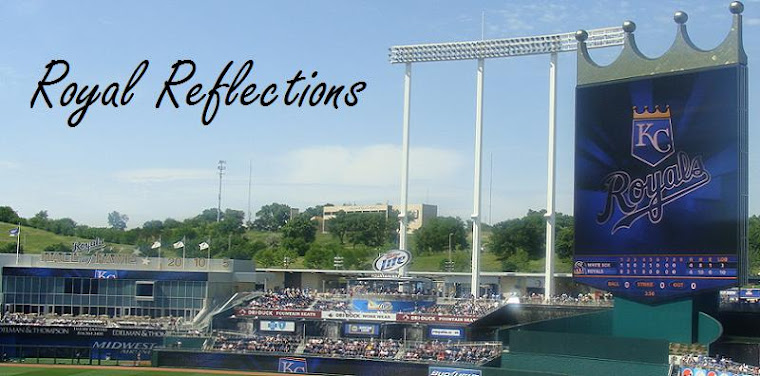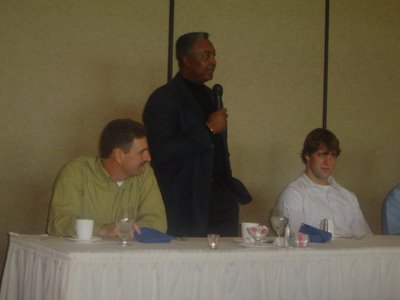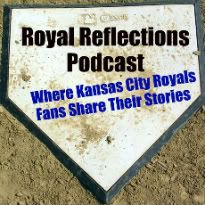During the Royals Caravan stop in Omaha on Wednesday, I had a chance to sit down one on one with Royals broadcaster Ryan Lefebvre to talk a little Royals baseball.
Q: You've been with the Royals now for eight seasons. Has it been everything you thought it would be when you came over from Minnesota?
A: It's actually been more. I thought I'd be with the Minnesota Twins forever. Going to the University of Minnesota and playing baseball there and starting with the Twins...and I've told few people this--my original plan was to come to Kansas City, get more radio experience because I was mostly a TV guy in Minnesota, and then maybe return to the Twins. It ended up being much better than I thought it was going to be. And now, here I am going on my ninth year and I have no desire to go anywhere else.
Q: You've developed a certain chemistry on the air with Denny Matthews by badgering each other with trivia. How did that develop? Was it something that happened off mic or did it just develop naturally on the air?
A: Probably both. I knew Denny and Fred (White) when I was with the Twins. But when I took the job, he (Denny) and I realized we both had a lot in common. Both of us had a father who was a baseball coach. Both of us played baseball in college. Both of us started very young in the major leagues. I think Denny was 25 or 26. I was 24. Both of us are still single. So, we just had a lot in common and man we laughed that night at that first dinner and that really broke the ice. And on the air, I really took my time. I certainly wasn't going to come in and say, "Hey, let me show you how good the new guy is." Denny is the voice of the Royals. I accept that. I believe in it. I'm his number two guy and I'm fine with that. But he gave me a lot of credibility as well by bringing me in during his innings and asking me baseball questions. We just get along. We laugh a lot. And frankly, the team has not been very good since I've been here so you have to find a way to keep things entertaining. When it's 11-3 in the eighth inning, every pitch isn't that important so you get off on other things. Sometime it's baseball related. Sometimes it has absolutely nothing to do with baseball. But we have a really good time.
Q: You told a story on the air early in the 2006 season about a woman who was around 100 years old. She was a huge Royals fan and she listened to you every night and you were a big part of her life. And in fact, she actually died while listening to a Royals broadcast. Do you remember that story?
I do. Her first name was Bobbie. We still have the pamphlet from her funeral up in the booth. She listened to the Royals game every day. And as you say, she passed away while she was listening to a game. We did a little more research and realized that she was listening during one of Denny's innings, so Denny killed her. [We both got a chuckle out of the joke.]
Q: Were you aware of how engrained the Royals Radio Network is among Royals fans? Or did Bobbie's story help to crystallize it in your mind?
A: I guess I wasn't that aware. I was aware of it in Minnesota--knowing how important the Twins were to certain fans. But then I came to Kansas City and two things stood out. We have the biggest radio network in the American League as far as affiliates. And then things have changed since I came to Kansas City, but when I first arrived they only televised about half the games. So it was a good market to be a radio announcer because for half the games the only option you had was on radio. But TV is important and we should be televising as much as we do because other teams are doing it. But for all those years the Royals did not believe in televising a lot of home games because they wanted people to come out to the ballpark. That only strengthened the marriage of the fans and the radio broadcast.
Q: Talk to me a little about taking over for Fred White when you did. Fans were not happy about it, but they didn't seem to take it out on you, did they?
A: I think three things came into play. Number one, the Kansas City fans were fair. They were not happy that Fred left. I knew that coming in. I expected it. It was hard, but I expected it. But the fans in the end were fair. They didn't expect me to be Fred. Number two, Denny supported me. Fred supported me on the air. There was the instant credibility there when Denny and Fred were saying, "Give this guy a chance to prove himself." And number three, I know that it's all about the players and the fans. We are just a conduit. People may say they listen to us, but they are really listening to the Royals. If Denny and I had a talk show and were just goofing around and there was no game, I don't think our listenership would be the same. So, I just always knew it was about the broadcast. Not about Ryan Lefebvre. It's about the broadcast. So the support from Denny and Fred, and the fans just being fair and taking their time before they wanted to accept me and just knowing my place--I guess the combination put it all together.
Q: Things have changed a lot since you've come to Kansas City. When you got here, the Royals had players like Jermaine Dye and Johnny Damon. And then they had some down years. Now they appear to be on the verge of competing in a year or two. Do you sense that?
Gosh. I have no idea. I'm so bad at predictions--only because injuries. The Royals could suffer an injury and that sets them back. The Twins and the White Sox and the Tigers could suffer injuries and that catapults the Royals. You just never know what's going to happen. But I do know that the pitching is going to be better. Ever since I've been a Royals announcer, the Royals have never really struggled scoring runs. It's never been a big problem. But pitching has been a huge problem. They've always been at the bottom of the league in ERA. The Royals are going to be more athletic. When they were in their glory years in the 70's and 80's that was their trademark. They were just an athletic team offensively. And they are stockpiling the minor leagues. So when the Royals are going to get back to being a perennial contender in the Central, I don't know when that is, but I truly do believe they're headed in that direction.
Q: Do you sense optimism in Kansas City, not just because of the Gordons and the Butlers, but also because of the philosophy change to stockpile young arms?
A: Yeah. Yeah. I think so. And I think Royals fans for the most part are just optimistic people. I think the people in Kansas City, and the region around Kansas City, including Omaha, are just dying to love this team. They have not become apathetic yet. Even if they are angry, it still shows that they have a passion for the team.
Q: They sure showed up in 2003.
A: They did. And it didn't take them very long to show up in 2003. By the second homestand we were packing the place because the Royals were 9-0 and then 16-3. And so, I think there is kind of an eternal optimism for the Royals in Kansas City. The team actually played well in the second half (of 2006). That was two different seasons. The bulk of the damage was done in the first half. In the second half, Dayton Moore comes in and he had an impact right away. Of course, he denies it. And you might say, how does a GM have an impact when they come in? It's because you (as a player) have a new set of eyes on you now. You're not anybody's guy. You're not Allard Baird's guy anymore. Dayton Moore is going to say, "Hey, is this guy any good?" There's no emotional attachment there. I think that just naturally peaked concentration and peaked performance somewhat. So I thought they played much better in the second half. Going down to the finish line in Detroit--sweeping three games in front of sellout crowds--the Tigers had to win one game to win the division, the Royals sweep them...their only road sweep of the year. That was huge. The question is, can you sustain that after being off for five months. We'll see.
Q: Fans seem to be confused about the constant change between signing a bunch of veterans versus going young. The Royals have switched back and forth numerous times in the past ten years. Now they've appear to have a better balance between veteran and younger guys. Would you agree? Or you you think the Royals are out of balance one way or the other?
A: The answer to that question is...does it help you to win games. If you are not winning games, and when you are not winning, you are always going to look for a reason why you are not winning. But every team, even when they are young, they have to have some veterans to show the guys the way. Going with a youth movement takes a lot of courage. You are not going to win right away. You're not going to win the next year. You might not win the next year. Then fans become impatient and more teams than not will then veer away from that youth movement maybe a year or two sooner than they should because they panic. The teams who have a youth movement that works--it's a long term youth movement. It takes years for it to happen. It takes a lot of patience. It takes luck. It takes drafting the right guys. It takes guys staying healthy. There are so many factors. In 2003, the year the Royals were in it up until the last two weeks of the season, in some ways it was good, but in some ways it put the Royals off track a little bit.
Q: That's when the Royals went out and got Brian Anderson...
A: Then the next year they signed Juan Gonzalez and Benito Santiago, but there was an opportunity. The Twins had lost some players to free agency. The White Sox had lost some players to free agency. The Royals were coming off their first winning season in forever. And so they saw an opportunity and they kind of went for it. But they did veer off of course. So going young does take some courage. It takes some time. Another thing we're not accustomed to in Kansas City, which we have to get used to is--having really good players in the minor leagues. That's okay. But since we've been so bad for so long, if we have a good player in the minor leagues we have this mentality that says, "Let's get him up! Let's bring him up!"
Q: Well, Omaha has been seen as a graveyard hasn't it? A place where veteran players go to see their careers die?
A: Yeah. I think that's going to change under Dayton Moore. This is going to be a legitimate level of minor league baseball. I think having a player in Double-A who should be in Triple-A, that's okay. Having a player in Triple-A that could play in the major leagues, that's okay. That's what good teams do.
 During the Royals Caravan stop in Omaha last Wednesday, I had a chance to do a brief interview with Royals first baseman, Ryan Shealy.
During the Royals Caravan stop in Omaha last Wednesday, I had a chance to do a brief interview with Royals first baseman, Ryan Shealy.








